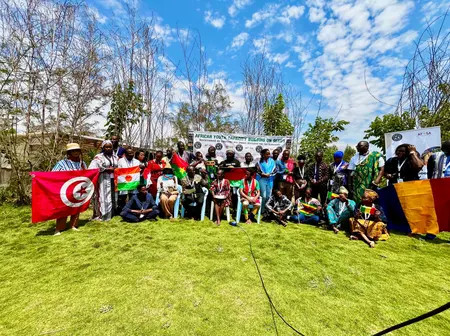Naakuru County, Kenya: Lake Elementaita in Nakuru, Kenya, set the backdrop for the voices of young food systems advocates as youth representatives from 22 countries converged at the Seed Savers Network Learning Center for an intensive five-day capacity-building workshop on seed sovereignty.
The gathering marked a significant milestone in the growing global movement to reclaim traditional seed systems and agricultural practices from corporate control.
The workshop brought together emerging leaders, smallholder farmers, environmental activists, and agricultural students from across Africa and beyond, united by a common commitment to preserving indigenous seed varieties and promoting farmer-led seed systems. Participants ranged from community organizers working in rural villages to university researchers studying traditional farming methods and even international institutions, creating a dynamic mix of grassroots experience and academic knowledge.
Over the course of five intensive days, participants engaged in hands-on learning sessions covering critical aspects of seed sovereignty, including community seed banking techniques, traditional seed preservation methods, and farmer-led documentation of local crop varieties. The workshop emphasized practical skills development, with attendees learning to assess seed security within farming communities and understanding the intricate relationship between biodiversity conservation and food security.
The Seed Savers Network Learning Center in Gilgil provided an ideal backdrop for these activities, with a gene bank, food forest, and other spaces showcasing indigenous crop varieties and traditional farming techniques that have sustained communities for generations. Participants could observe firsthand how local seed saving practices contribute to agricultural resilience and food sovereignty.
During the presentation of the AFSA Youth Statement, Irene Chebet of Baringo Youth Peace and Climate Movement emphasized the critical role of local action: “Local youth action is the heartbeat of sustainable development.” Her sentiments were echoed by AFSA senior official Awa Gueye from Senegal, who stressed that youth participation was vital for continuity in agroecology. “There can be no sustainability without the youth. Agroecology is a movement and a spirit that needs to be handed over to the next generation,” she said.
The timing of this workshop reflects growing concerns across Africa about the impact of restrictive seed laws and the increasing corporatization of seed systems. Youth groups are seeking to turn the tide by pushing governments to include food sovereignty, security, and agroecology issues within national policies, as young people recognize that the future of food security depends largely on maintaining diverse, locally-adapted seed varieties.
AFSA senior official Awa Gueye from Senegal reinforced the youth’s message, emphasizing the generational imperative of the movement. “There can be no sustainability without the youth. Agroecology is a movement and a spirit that needs to be handed over to the next generation,” Gueye declared.
Discussions during the workshop highlighted the tension between traditional farming practices and modern agricultural policies that often favor certified seeds from large corporations over indigenous varieties that have been developed and maintained by farming communities for centuries. Participants examined case studies from their respective countries, sharing experiences of how restrictive plant variety protection laws impact smallholder farmers and limit access to traditional seeds.
The international composition of the workshop created unique opportunities for cross-border learning and collaboration. Young participants from West Africa shared experiences with drought-resistant millet varieties, while those from East Africa discussed indigenous beans and sorghum preservation techniques. Southern African representatives brought insights into community seed fairs and exchange systems that help maintain crop diversity across regions.
These exchanges proved particularly valuable as participants recognized common challenges faced by farming communities regardless of geographic location. From climate change impacts to policy barriers, the issues affecting seed sovereignty transcend national boundaries, making international cooperation essential for effective responses.
The workshop emphasized not just knowledge transfer but also leadership development, recognizing that young people will play a crucial role in shaping the future of agricultural systems. Participants engaged in strategic planning sessions, developing action plans for implementing seed sovereignty initiatives in their home communities.
Networking sessions allowed attendees to forge connections that extend beyond the five-day program, creating a support network of young advocates committed to promoting seed sovereignty across multiple countries. These relationships are expected to facilitate ongoing collaboration and knowledge sharing as participants return to their respective communities to implement what they learned.

Leave a Reply